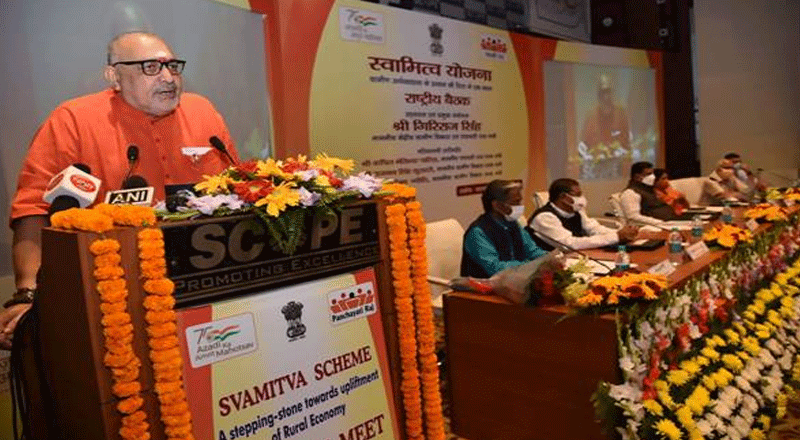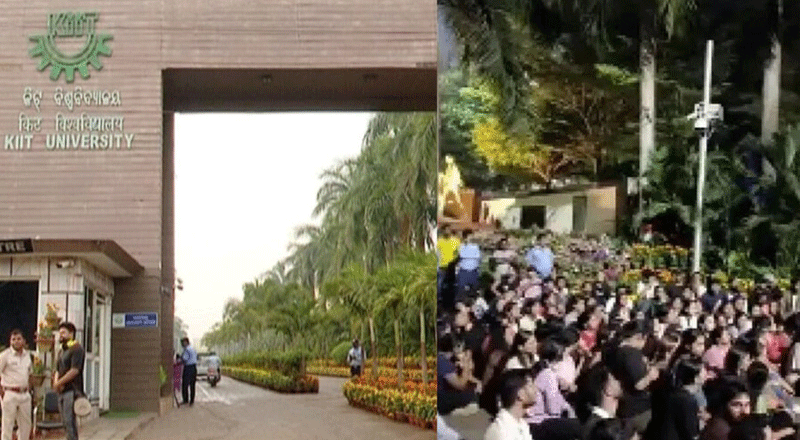SVAMITVA (Survey of Villages and Mapping with Improvised Technology in Village Areas). The scheme was launched by the Prime Minister on National Panchayati Raj Day, 24th April 2020 with a resolve to enable economic progress of Rural India by providing “Record of Rights” to every rural household owner.
Phase I – Pilot Scheme (April 2020 – March 2021): Covers States of Haryana, Karnataka, Madhya Pradesh, Maharashtra, Uttar Pradesh, Uttarakhand, Punjab, Rajasthan, Andhra Pradesh and establishment of Continuous operating Reference systems (CORS) in the State of Haryana, Madhya Pradesh, Punjab and Rajasthan
Phase II (April 2021 – March 2025) – Complete survey of remaining villages by 2025 and CORS network set up across the Country by 2022.
Achievements under SVAMITVA Scheme during the year 2022
- As on December 2022, drone flying has been completed in 2,03,118 villages
- Drone flying has been saturated in Dadra and Nagar Haveli and Daman and Diu, Delhi, Haryana, Lakshadweep Islands, Puducherry, Uttarakhand, Goa, Andaman and Nicobar Islands.
- Property cards have been prepared for all the Inhabited villages of Haryana and Uttarakhand. The preparation and distribution of SVAMITVA cards will soon be completed in Union Territory of Puducherry.
e-Gram Swaraj e-Financial Management System
In order to strengthen e-Governance in Panchayati Raj Institutions (PRIs), eGramSwaraj, a Simplified Work Based Accounting Application for Panchayati Raj, was launched on the occasion of National Panchayati Raj Day on April 24, 2020. It has been developed amalgamating the functionalities of all the applications under e-panchayat Mission Mode Project (MMP). e-GramSwaraj assists in enhancing the credibility of Panchayat through inducing greater devolution of funds to PRIs. It brings better transparency through decentralized planning, progress reporting and work-based accounting. Furthermore, the application provides a platform for effective monitoring by higher authorities.
Integration of Beneficiary details with eGramSwaraj:
In order to enhance transparency and empower Panchayats, Ministry of Panchayati Raj has been pursuing to integrate beneficiary details of various union Ministries/ Departments with e-GramSWARAJ Application. The information shall be made available to Gram Panchayats, to read out in the course of the Gram Sabhas for public verification. This verification would be a landmark in ensuring accountability through digitalization and public participation.
Geo-tagging of assets:
As a part of effective monitoring, it is imperative to have field-level monitoring of physical progress of the works. Further, supplementing to strengthening the system; geo-tagging of assets (on completion of work) is of utmost importance. Ministry has developed mActionSoft – a mobile based solution to help in capturing photos with Geo-Tags (i.e. GPS Coordinates) for the works which have asset as an output. Geo-tagging of the assets is done in all three stages viz. (i) before start of the work, (ii) during the work and (iii) on completion of work. This would provide a repository of information on all works and assets related to natural resource management, water harvesting, drought proofing, sanitation, agriculture, check dams and irrigation channels etc.
Progress (as of December 2022): 2.05 lakh photographs of the assets have been uploaded by the Gram Panchayats for the activities taken under Fifteen Finance Commission in the current year.
Citizen Charter
In order to focus on the commitment of the Panchayati Raj Institutions (PRIs) towards its Citizens in respects of Standard of Services, Information, Choice and Consultation, Non-discrimination and Accessibility, Grievance Redress, Courtesy and Value for Money, Ministry has provided platform to upload Citizen Charter document (https://panchayatcharter.nic.in/) with the slogan “Meri Panchayat Mera Adhikaar – Jan Sevaayein Hamaare Dwaar” (मेरी पंचायत मेरा अधिकार – जन सेवाएं हमारे द्वार). This also includes expectations of the Organization from the Citizen for fulfilling the commitment of the Organization.
Department of Administrative Reforms and Public Grievances in Ministry of Personnel, Public Grievances and Pensions, Government of India, in its efforts to provide more responsive and citizen-friendly governance, coordinates the efforts to formulate and operationalize Citizens’ Charters in Central Government, State Governments and UT Administrations. It provides guidelines for formulation and implementation of the Charters as well as their evaluation. Till December 2022, 2.15 lakh GPs have uploaded their approved Citizen Charter and offering 952 services to citizen out of which 268 services are delivered through online mode.
Audit Online
As a part of the critical institutional reform, Fifteenth Finance Commission (XV FC) has stipulated that the audited reports of Panchayat accounts need to be made available in the public domain, as an eligibility criterion. In this regard, MoPR had conceptualized the application “AuditOnline” for carrying out online audit of Panchayat accounts pertaining to Central Finance Commission Grants. It not only facilitates the auditing of accounts but also provisions for maintaining digital audit records pertaining to audits that have been carried out. This application provides for streamlining the various audit processes, namely, audit inquiries, draft local audit reports, draft audit paras etc. One of the unique features of this application is that it is entirely configurable to suit to the States’ Audit process / flows complying to the respective State Audit Rules/Act(s). AuditOnline is also linked to eGramSwaraj for ease of flow of accounting related information pertaining to the Panchayats.
Finance Commission Grants to Rural Local Bodies
Fifteenth Finance Commission (XV FC) has made allocations of grants to the Rural Local Bodies. Its allocation for the period FY 2020-21 is Rs.60, 750 Crore and for the period 2021-2026 is Rs.2,36,805 crores, which have been allocated to Panchayats in all tiers and traditional bodies in Non-Part IX States and Sixth Schedule areas.
Rural Technology Advancements – Smart Vending Cart
In its efforts towards leveraging technology for Rural Development, MoPR has collaborated with Principal Scientific Advisor to Government of India, Department of Science and Technology and six IITs in developing Smart Vending Cart to be used by Vendors in the rural areas. The Smart Vending E-Cart, designed by IIT Bombay, has been demonstrated and found to be quite appropriate for use the vendors / small businesses in rural, peri-urban and farm sectors.
The Smart Vending E-Cart has multifaceted user-friendly enabling technologies and features which provides proper storage and temperature for enhanced shelf life of perishable foods/items like vegetable & fruits etc. It has enhanced features for modularity, ergonomics, foldability, customer attraction, solar power LED lighting, mist cooling, weighing machine, mobile charging, radio, sitting facility, water, cash box, waste disposal bin, sanitizers, digital payment facility etc. IIT Bombay is collaborating with fabricators for mass production of the Smart Vending Carts through PPP model. The product has also been developed in various types, namely, retrofit, manual and smart ‘e versions’.
The Ministry of Panchayati Raj and NIC–MoPR are in the process of developing a portal to serve as platform for the retail of Smart eVending carts, in rural areas of the country.
In pursuance of the Prime Minister’s commitment towards addressing climate change made during the CoP 26 held in Glasgow in November 2021, Ministry of Panchayati Raj has started the Gram Urja Swaraj initiative, with an aim to promote adoption of renewable energy at Gram Panchayat level. The Ministry of Panchayati Raj has also launched the Gram Urja Swaraj Portal in May 2022, to capture the inclination of Panchayati Raj Institutions (PRIs) towards adoption of renewable energy.
Implementation of the Provisions of the Panchayats (Extension to the Scheduled Areas) Act, 1996 (PESA)
On 9th September, 2022, MoPR has sent a letter to Principal Secretary/Secretary of Panchayati Raj Department of all PESA States requesting to share the Action Taken Report on the important suggestions/ ideas/ issues which had emerged during deliberations/discussions among representatives of all PESA States in the National Level Conference on PESA held on 18.11.2021 at New Delhi.
On 13th September, 2022, Minister of Rural Development & Panchayati Raj requested the State Panchayati Raj Ministers of Jharkhand, Odisha & Madhya Pradesh, who have not yet framed PESA Rules, to ensure PESA Rules are notified without further delay.
Recently, States of Chhattisgarh and Madhya Pradesh have notified their State PESA Rules on 08.08.2022 and 15.11.2022 respectively.
Based on continuous advocacy and persuasion by the Ministry of Panchayati Raj, at present, out of ten PESA Sates, eight States namely Andhra Pradesh, Chhattisgarh, Gujarat, Himachal Pradesh, Madhya Pradesh, Maharashtra, Rajasthan and Telangana have framed their State PESA Rules under their respective State Panchayati Raj Acts/laws.
In Jharkhand and Odisha, the process of inter-departmental consultation is still in progress.
Capacity Building of Panchayati Raj Institutions
The Capacity Building of Panchayati Raj Institutions (PRIs) has been one of the major activities of Ministry of Panchayati Raj (MoPR). The Ministry has been providing programmatic, technical and institutional support for strengthening of PRIs including advocacy support for inter-ministerial and multi-sectoral coordination. Under the ambit of capacity building, knowledge support is also being provided for enhancing devolution to PRIs and finding solutions for local governance as well as outreach towards strengthening rural India. Some of the major activities undertaken towards capacity building of PRIs have been described in the succeeding sections:
(a) Rashtriya Gram Swaraj Abhiyan (RGSA): Centrally Sponsored Scheme of RGSA implemented from 2018-19 to 2021-22 and an amount of Rs.2149.09 crore was released and more than 1.42 crore Elected Representatives, Functionaries and & other stakeholders of Panchayats were provided various and multiple trainings.
(b) Revamped Rashtriya Gram Swaraj Abhiyan (2022-23 to 2025-26): Centrally Sponsored Scheme of Revamped RGSA approved by Cabinet Committee on Economic Affairs (CCEA) on 13.04.2022 for implementation from 01.04.2022 to 31.03.2026 (co-terminus with XV Finance Commission period) at a total cost of Rs.5911 crore including Central Share of Rs.3700 crore and State share of Rs.2211 crore.
The focus of the scheme of Revamped RGSA is on re-imagining Panchayati Raj Institutions as vibrant centers of local self-governance with special focus on Localization of Sustainable Development Goals (LSDGs) at grassroot level adopting thematic approach through concerted and collaborative efforts of Central Ministries and State Line departments and other Stakeholders with ‘Whole of Government and Whole of Society’ approach.
Coverage: The Revamped RGSA will extend to all States and Union Territories (UTs) of the country. For the purpose of these guidelines, wherever ‘Panchayats’ are mentioned, these will include institutions of rural local government in non-Part IX areas.
Funding pattern: The scheme comprises of both Central and State Components. The Central Components of the scheme is fully funded by the Government of India. However, the funding pattern for State Components is in the ratio of 60:40 among Centre and States respectively, except NE, Hilly States and UT of J&K where Central and State share is 90:10. For other UTs, Central share is 100%.
Achievements under revamped RGSA: An amount of Rs.435.34 crore has been released to 11 State (Arunachal Pradesh, Assam, Himachal Pradesh, Karnataka, Kerala, Maharashtra, Mizoram, Odisha, Punjab, Sikkim and Uttarakhand) and other implementing agencies as on 12-12-2022 and more than 13 lakh Elected Representatives, Functionaries and & other stakeholders of Panchayats were provided various and multiple trainings for which details have been uploaded on Training Management Portal.





